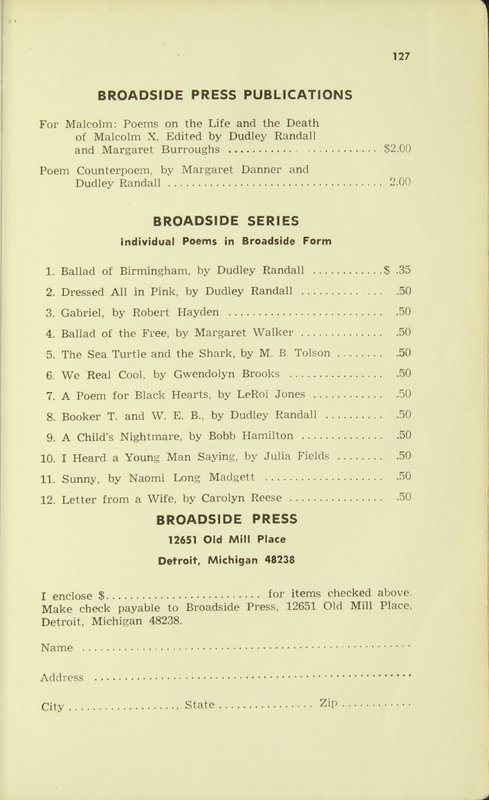Over the years, many part-time employees worked with Broadside, but Dudley Randall remained the only constant, at times taking on many roles in the business. Randall’s position as the head of the company was described by his biographer, Melba Boyd, as a “literary caretaker, not a competitive entrepreneur.” To this end, Randall put royalties earned from his own books back into the company and never received a salary. Throughout his time at Broadside, Randall remained employed as a reference librarian and occasionally taught writing classes. On lunch breaks from the library, he would drive to the Broadside offices to keep up with his editorial work, with a sandwich in one hand and poetry submissions in the other.
“Once Gwendolyn Brooks asked me what title to call me by. I replied that since I, in my spare time and in my spare bedroom, do all the work, from sweeping floors, washing windows, licking stamps and envelopes, and packing books, to reading manuscripts, writing ads, and planning and designing books, that she just say that Dudley Randall equals Broadside Press.”
Randall in the Broadside office with John Walthal and Lottie Butler.
“Broadside Press began without capital, from the twelve dollars I took out of my pay check to pay for the first Broadside, and has grown by hunches, intuitions, trial and error.”
Randall believed that Black publishers should establish a direct relationship with Black bookstores. To foster these sorts of relationships, Randall would sell Broadside books to Black bookstores on consignment. In addition to the original work published by Broadside, the press also served as the American distributor for the Heritage Series, a British anthology series that collected works of African American poetry.
The Decline of Broadside Press
In 1975, Broadside Press was as popular as it ever had been. The mayor of Detroit honored Randall on the occasion of Broadside’s 10th anniversary. This success led Randall to overcommit to the number of books Broadside could publish in a year. A business manager was hired to look into Broadside’s financial situation, and he discovered an increasing amount of debt to Broadside authors and to the printer. This coincided with a national economic downturn and increased inflation. By the end of 1975, it became clear that Broadside’s financial situation would be too much for Randall to deal with on his own.
Randall with Sonia Sanchez and Detroit Mayor, Coleman Young, at Broadside’s 10th anniversary celebration.





